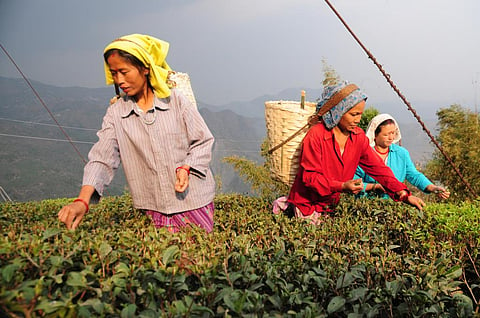

The Green Leaf Price Monitoring Committee, which monitors the average green leaf price payable to small tea growers, did not meet even once in 10 out of 18 tea growing districts in Assam in the 2016-17 to 2020-21 period, an audit by Comptroller and Auditor General of India has revealed.
This is significant against the backdrop of recent reports that small tea growers have been facing a price crisis this year, with many of them having to sell tea leaves at prices less than the cost of production.
The report, Role of Tea Board India in the Development of tea in India, was tabled in the Parliament on August 8, 2023.
Tea Marketing Control (Amendment) Order, 2015 provides for the constitution of the Green Leaf Price Monitoring Committee in each tea growing district. The committee must monitor the average green leaf price payable to small tea growers.
In the remaining eight out of 18 districts in Assam, the number of meetings held in a year was less than four. Similarly, in five tea-growing districts in West Bengal, the number of meetings held was less than two per year during the period 2016-17 to 2020-21.
Meetings of the Committee should be conducted as stipulated in the Tea Marketing Control Order to protect the interests of small tea growers and ensure payment of the minimum benchmark price of green leaves, the report recommended.
In June this year, the Confederation of Indian Small Tea Growers Associations (CISTA), which is the apex body of small tea growers, released a status paper on the constraints under which small tea growers are working and the interventions needed to help them out.
Small tea growers contributed over half of total tea production in 2020- 21. However, in absence of a well-defined strategy for identification and registration of small tea growers, 38 per cent of them were not registered as of March 2021 and were out of the ambit of Tea Board’s regulatory activities and developmental assistance, the audit report highlighted.
Similarly, 119 out of 1,573 big tea growers were not registered as of March 2021.
“Thus, it is recommended that the Tea Board build a well-defined strategy for identification of all the small tea growers, maintain a database and bring them under its ambit for extending developmental assistance and regulatory control,” the CAG said.
Further, though the Tea Act, 1953 authorised the Board to inspect the quality of tea, factories were not adequately inspected during 2016-17 to 2020-21, the report found. The shortfall of inspection ranged between 78.62 per cent and 91.95 per cent, which showed poor monitoring on the part of the Tea Board.
The Board directed its officials to collect tea samples from the manufacturing units and send the same to the authorised laboratories for testing. The samples are to be tested for quality assurance once in six months, in line with Clause 12 of the Food Safety and Standards (Licensing and Registration of Food Businesses) Regulations, 2011.
However, there was a shortfall in sample collection ranging between 84 per cent and 97 per cent during the audit period, indicating poor monitoring, the audit observed.
It also found the Tea Board disbursed subsidy amounting to Rs 12.87 crore under various schemes, without adhering to the guidelines.
Moreover, government funds of Rs 1.55 crore were lying in the bank account of one beneficiary who could not set up a new factory within the time frame stipulated in scheme guidelines, but no recovery was initiated by the Board.